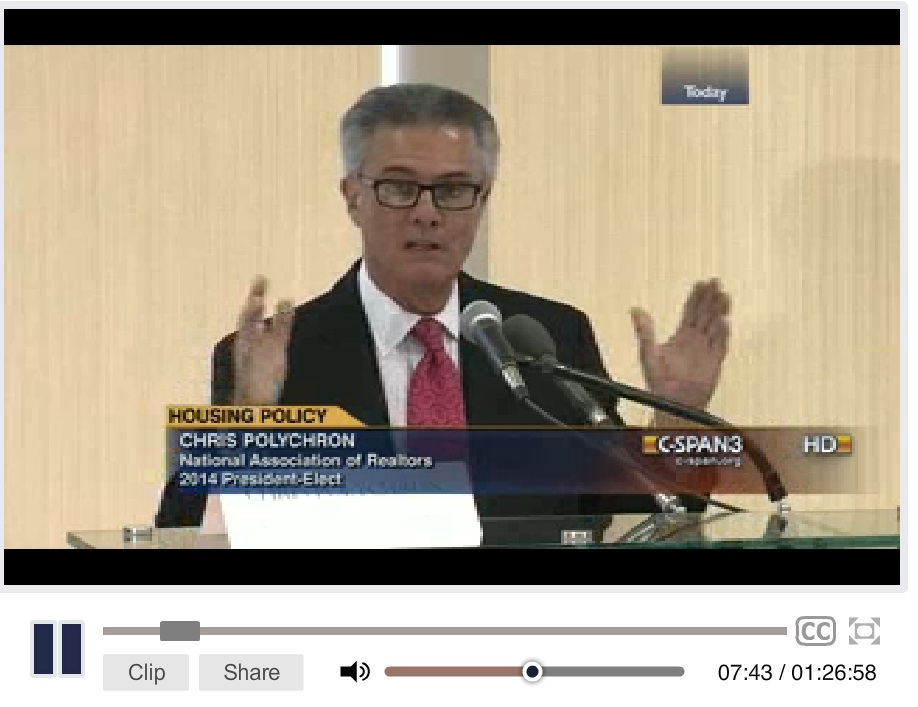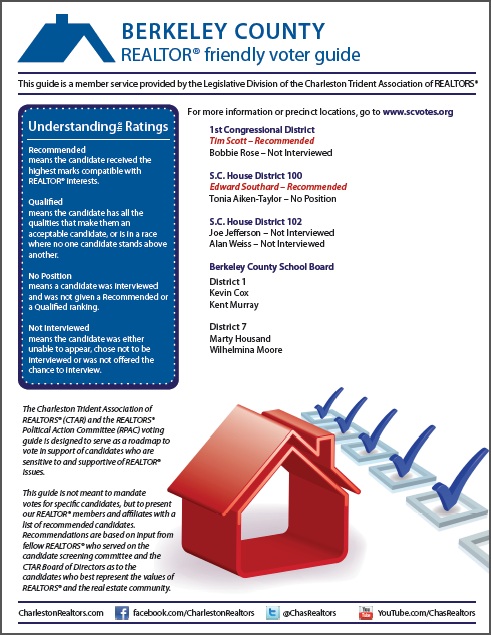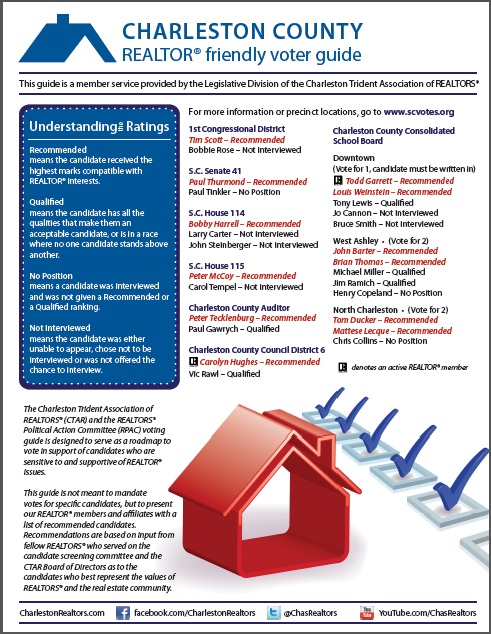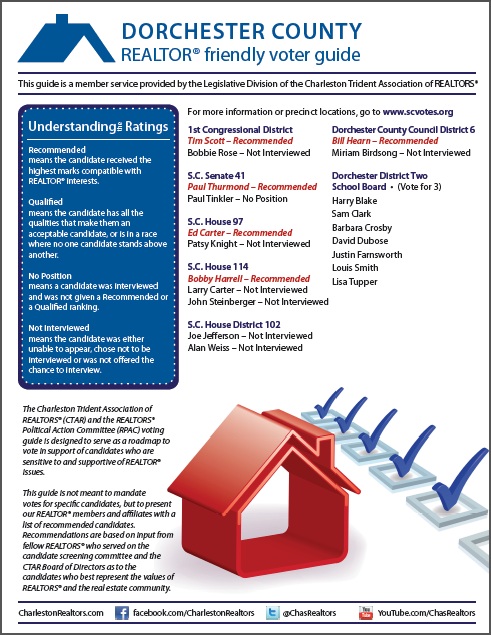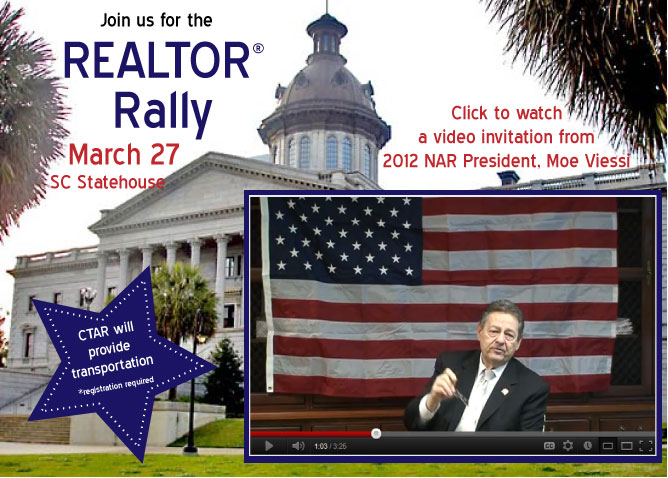Legislative Update for the week of April 5
Mt. Pleasant Planning Committee Stakeholders Meeting 4.7.2015
CALL TO ACTION
The town of Mt. Pleasant is considering drastic measures to restrict development. The Mayor, along with the majority of council, plan to raise impact fees, raise property taxes to purchase open space, and eliminate all density bonuses.
TAKE ACTION to contact town officials today opposing these drastic measures to restrict development and explore sensible, market driven solutions to responsibly handle growth. Read more about the issue here.
This Week at a Glance
• While Dorchester County residents face the highest tax rate in tri-county area, a recent survey found the building cost of permits and fees averages $13,204 per house in Mount Pleasant, $7,269 in Charleston, $6,306 in Summerville and $3,850 North Charleston.
• Following a hostile review at planning commission, The Central Mount Pleasant project pulled their rezoning request before town council.
• After the surprise release of the Mt. Pleasant Growth Management Plan, Councilman Mark Smith held an Economic Development Committee Stakeholders Meeting last Tuesday to receive business leaders input on the proposed changes.
Mt. Pleasant Growth
With growth concerns at a fever pitch, Mt. Pleasant town council voted 8-1 Tuesday night to approve ill-advised measures found in the proposed Growth Management Plan to restrict development. We commend Councilman Mark Smith for being the sole voice asking for independent expert analysis on handing growth. Also, Smith was the only council member willing to address Mt. Pleasant’s growing housing affordability problem.
The plan includes raising impact fees, property taxes, and eliminating all density bonuses. These measures are in stark contrast to the provisions laid out in our public policy guide.
“While we understand the Town’s growth concerns, we are asking them to take a step back and conduct additional analysis. To fully consider some of the unintended consequences of stifling growth and development–such as potentially artificially inflating both residential and commercial real estate prices and making the Town unaffordable for current and future residents” said Wil Riley, CEO of the Charleston Trident Association of Realtors®.
Council will likely give second reading to these changes at a Special Planning Commission meeting, where they would then be finalized. The meeting will be held on April 28, 5pm at Mt. Pleasant Town Hall Chambers (100 Ann Edwards Lane). We encourage all Realtors® to attend.
How Are These Restrictions Problematic?
If the town restricts the availability of affordable housing options it will put additional strain on supply and potentially artificially inflate prices. Some residents will be unable to afford to remain living in Mount Pleasant and be forced elsewhere. Senior citizens and empty nesters hoping to downsize will be unable to afford to do so.
If the town raises impact fees, it will only raise taxes on the end user – the property buyer – through the built-in cost of construction. Impact fees are a temporary substitute for the town not being willing to pay for adequate infrastructure demanded by current residents. In the end, it only serves to encourage a more costly problem: sprawl.
TAKE ACTION to contact town officials today opposing these drastic measures!
Legislative Update for the week of March 22
This Week at a Glance
- While many communities oppose it, Carolina’s congressmen have varied views on Atlantic drilling
- Mayor Joe Riley says changes to Charleston’s BAR are on the way, including creating two review boards to handle new architecture and preservation work separately
- A Mount Pleasant Council growth deal unveiled last Tuesday was struck behind closed doors and without local associations input
- Coastal S.C. remains a hot spot for population growth, with Myrtle Beach in second, Hilton Head thirteenth, and Charleston seventeenth nationally
- As hard times recede, numerous political bodies are taking up raises
In the Field
This week, SCR hosted the Annual Realtor Rally in Columbia, where hundreds came from across the state to advocate for real estate license law reform, business license tax reductions, patent reform, environmental litigation reform, and property tax reform. Attendees had a BBQ lunch with their legislators and heard from Governor Haley, the event’s keynote speaker. If you couldn’t make it, be sure to next year!
The rest of the week was dedicated to monitoring Mt. Pleasant’s new initiative to control growth. The Mayor, along with the majority of council, are proposing curbs to the allowed number of residential units, increasing the cost of infrastructure onto developments, and raising taxes to purchase open space and build recreational facilities. Council will debate the proposed changes at their next meeting, April 14th, and we encourage all Realtors® to attend.
We were disappointed with the Town of Mount Pleasant leadership’s unexpected announcement and feel that they came to a very rash and divisive decision without considering the full impact on the town’s property owners. However, we look forward to working with Town leadership and council, the Chamber and the Homebuilders Association to arrive at a solution that protects the best interests of Mt. Pleasant home, property and business owners.
Legislative Update for the week of March 8

Mt. Pleasant Town Council 3.10.15
This Week at a Glance
- Former School Board member Elizabeth Moffly is pressing officials to break up the Charleston County School District
- The Beach Co. withdrew its Sgt. Jasper site rezoning request from the Charleston Planning Commission following weeks of public opposition and losing the support of Councilman Mike Seekings
- Hanahan officials say a land deal is off for its proposed new elementary school
Mt. Pleasant Town Council members voted 6-3 in support of a proposed pay increase that will almost double their current compensation - A $500 million borrowing in the State House was killed this week, paving way for a new budget consensus
The Future of Charleston’s Architecture
City Consultant Andres Duany gave his final talk on Charleston’s architecture Friday morning, recommending a smaller jurisdiction of the Board of Architectural Review, a sliding scale of requirements for new buildings, and amending the appeals process. Public reception will largely determine if the recommendations are ever implemented as the city addresses mounting growth concerns.
Charleston County Subdivision Regulations
At the urging of land surveying groups and builders, the Charleston County Planning Commission amended subdivision requirements for subdivision plats by requiring a preliminary wetlands determinations letter from the U.S. Army Corps of Engineers, which will reduce the cost associated with inheriting land.
Realtor Rally
Join us on March 24 at 10 am at the Columbia Metropolitan Convention Center and the South Carolina Statehouse, to show your support for the American Dream of Homeownership and Quality of Life for all South Carolinians! The day’s events will include a full issue briefing by your SCR lobbyist, grassroots events inside the Statehouse, and a BBQ lunch with your legislators. Governor Haley plans to address the group from the Capitol stairs. Join your fellow Realtors®, legislators and the media as we let our voices be heard. The issues we’re tackling this year are:
- Real Estate License Law Update & Modernization
- Business License Tax Reduction
- Patent Reform
- Environmental litigation Reform
- Property Tax Reform
Register here.
If there is enough participation, CTAR will provide transportation to the event.
Legislative Update for the week of March 1

Mt. Pleasant Town Council Committee Meeting 3.2.2015
News at a Glance
- Mt. Pleasant council members move to raise their pay from $8,918 to $15,000 and the mayors from $24,000 to $42,000 per year
- Gov. Haley and Speaker Lucas are working to resurrect ethics reform after stalling in the State Senate
- Mayor Linda Page met with County representatives and the SCDOT who agreed to study widening S.C. Highway 41
- the City of Charleston may not have a GOP mayoral candidate this year
- State House lawmakers approved a bill to streamline local governments’ funds
- Rep. Horne proposed the South Carolina Jobs, Education and Tax Act – a plan to pump $1.3 billion into roads and schools by making property tax rates uniform across the state
- Daimler announced a $500 million expansion plan in the Lowcountry, and our regional port competitor, the Savannah Harbor, was awarded a $134.5M contract for expansion.
FCC Approves Net Neutrality Rules
The Federal Communications Commission (FCC) approved new net neutrality rules, which gives the Commission strong legal authority to regulate broadband providers more heavily than in the past and restrict their power to control download speeds on the web. The new rules ban Internet providers from blocking or slowing any traffic and from striking deals with content companies, known as paid prioritization, for smoother delivery of traffic to consumers. The new rules are a victory for consumers, and for REALTORS® who embrace technology and online resources to meet the needs of their clients.
FAA Proposes Commercial Drone Rule
The FAA has begun the rulemaking process to address the commercial use of unmanned aerial vehicles, otherwise known as drones. The proposed rule would allow commercial use of drones in a variety of situations, including real estate photography. The rule governs machines weighing 55 lbs. or less, and some of the restrictions placed on operators include: daylight flights only, line of sight operations only, flights limited to an altitude of 500 feet, and operator certification by the FAA.
FEMA Holds Standard Hearings
The White House recently issued an Executive Order 13690: “Establishing a Federal Flood Risk Management Standard and a Process for Further Soliciting and Considering Stakeholder Input.” This Executive Order (EO) requires that any new construction or development in, and affecting floodplains funded by the federal government, will be required to meet the level of resilience established in the Federal Flood Risk Management Standard (FFRMS).
To obtain public input on the FFRMS, FEMA has announced several listening sessions on implementation of the standards. These sessions provide the opportunity to listen, ask questions, and provide feedback on how federal agencies implement the Standard.
Legislative Update for the week of February 15
In the News
The Ethics Commission will investigate complaints that Folly Beach mayor Goodwin pushed for approval of a referendum in an official letter, Dick Elliot dropped out of Charleston mayor’s race, the Charleston County School Board is moving cautiously in superintendent search, the Tides IV condo project plans to break ground next month in Mount Pleasant, IOP & Sullivan’s are still working toward beach parking pass, Vice President Biden visited Mount Pleasant’s port to promote a new transportation plan, Charleston County School Board is not sold on a proposed alternative high school, a crowd angry over density put the Charleston Planning Commission meeting about Sergeant Jasper site on hold, Charleston upper peninsula is planning for a new major apartment complex, ten candidates are in the race for four Sullivan’s Town Council seats, a proposed property tax plan in the legislature would raise $2 billion for schools and roads, and Charleston’s growing pains were the main topics of Monday’s mayoral forum.
Mt. Pleasant Growth
Town Council met last week, where they reassured more than 200 residents present of their plans to control growth through strict codes enforcement and requiring greater commission input on major projects. Council also backed out of a deal to lease parking spaces from the proposed garage on Shem Creek. CTAR’s Legislative Committee has now formed a Mt. Pleasant Growth Issues Task Force.
Charleston City Entertainment District
Last Wednesday we met with Charleston’s Late Night Activity Review Committee, where members proposed the city taking control of liquor licenses from the state, soft closing for bars, and limiting parking variances for late-night establishments to control growth.
2015 NAR Legislative and Regulatory Priorities
- Homeownership and Real Estate Investment Tax Policies
The growing federal debt, weak economic recovery, and continued growth of tax complexity have kept tax reform near the top of the national agenda and places a variety of tax laws, including those affecting commercial and residential real estate, under increased scrutiny. - Credit and Lending Policies
Overly stringent lending standards have continued to limit the availability of affordable mortgage financing for credit worthy consumers and federal policymakers are weighing a number of proposals aimed at creating healthier housing and mortgage markets. - Business Operations
There are a number of issues before Congress and the Federal Regulatory Agencies that could have a significant impact on the business operations of real estate firms, including a 3% cap on fees and points, RESPA/TILA harmonization, copyright protections, net neutrality, patent reform, and appraiser independence regulations. - Commercial
More than $1.2 trillion in commercial real estate loans will come due over the next few years, and many of these deals will have trouble getting financing. NAR supports consideration of legislation and regulations to protect and enhance the flow of capital to commercial real estate.
For more information about CTAR’s Legislative initiatives please contact Patrick Arnold.



